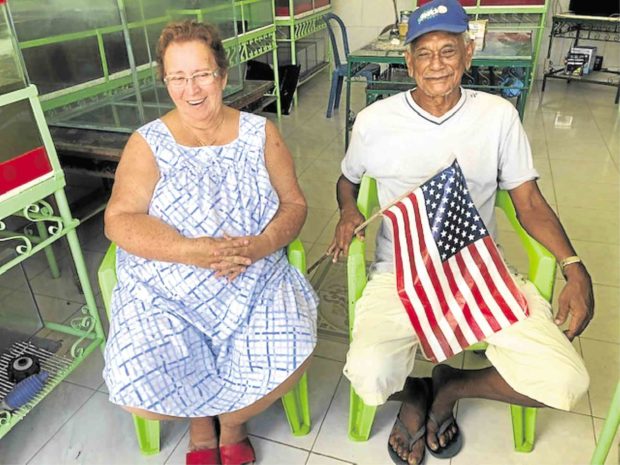
DADDY ISSUES Sired by American soldiers during World War II, Ma. Norma Quick Baltazar, 74, and Jaime Noveda, 73, find themselves pining for fathers they hardly knew and a life in the United States that they can only dream about. —DANNY PETILLA
PALO, Leyte, Philippines — Her only memory of her father was a black-and-white photograph of a handsome white man cradling a rooster on his bare chest. When the photograph got lost, her memories of him faded as well although the longing for a father didn’t.
“My feelings for my father will always be with me as long as I live,” said Ma. Norma Baltazar, now a 74-year-old grandmother, who was 8 when she learned from her mother that her real father was an American soldier named James Quick.
Her mother’s revelation solved the mystery of why Baltazar was the only fair-skinned sibling among seven others.
Wartime fling
Baltazar’s mother, Severina Baldevia, was 19 when she got smitten with Quick, a twentysomething member of the United States Navy in Tacloban City in 1944. Their wartime fling produced Norma Baldevia Quick, born Oct. 3, 1945.
Quick was part of the triumphant liberation forces headed by Gen. Douglas MacArthur that stormed Red Beach in this town 75 years ago today, to make good his famous “I shall return” promise to Filipinos who had looked at the Americans to liberate them after almost four years of harsh Japanese occupation.
But Quick never got to fulfill his promise to return to Severina and their daughter; he was killed in a bombing raid in Okinawa a few months later.
Missing bond
“(He’s) a missing part of me that will never make me whole,” said Baltazar, a retired village chief of Caloogan in this town.
This missing bond between father and child is shared by Jaime Noveda, a 73-year-old retiree. In 1945, his then 18-year-old mother Presentacion had a brief liaison with an African- American soldier named James Branson in the heady closing months of World War II.
“My mother’s house was in front of the American garrison in Palo. My father would come out at night and meet her,” said Noveda.
“Now I have a dozen grandchildren that started with him,” added Noveda, showing a wide, toothless smile.
Unlike Baltazar, Noveda got to meet his father when the Washington native came back to Manila in 1954 with a plan to bring his son with him to America. But his mother said no.
“I don’t know what life would have been like if I had made it to America,” said Noveda, a tall, gangly man who, in his heyday, regaled the townsfolk here with his basketball prowess.
Noveda and Baltazar are part of the estimated 2,000 “liberation babies” born in the Philippines after World War II. In the 1970s, there was a big push by the US International Red Cross to reunite these babies with their American fathers.
Offer rebuffed
But just like Noveda’s mother, Baltazar’s mother also said no, rebuffing the American government’s offer to provide immigration and educational benefits to the children their soldiers had left behind.
“My mother had a mortal fear of being separated from me, so she said no,” said Baltazar, now married to her second husband Reynaldo Baltazar, a retired policeman.
All these years, the annual commemoration of the Leyte Landing rites on Oct. 20 has stirred giddy feelings in Baltazar and Noveda who continue to nurse faint hopes of seeing their fathers in some parade or in the hotels frequented by visiting American veterans.
“I went from hotel to hotel looking for my father,” said Baltazar of one such commemoration, despite her mother’s revelation about her father being killed in a bomb attack in Okinawa before the war ended.
Annual parade
Noveda himself has attended every annual parade of American veterans returning to Leyte since that one and only meeting with his father in 1954. Reuniting with his father in some dramatic twist of fate remains a fervent wish, he said.
“It’s a crazy feeling, but hope is all we’ve got,” said a teary-eyed Noveda.
In their twilight years, the children left by the liberators of Leyte wish that fate had been kinder. They’ve never received any support from the American government or their father’s families, they said.
“This deep longing for our fathers—that’s the one thing that unites us,” said townmates Noveda and Baltazar on the eve of the 75th anniversary of the Leyte Landings, the one historic event that made their lives possible.